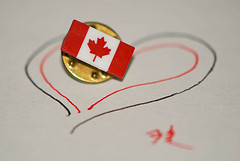All Maple Trees Are Not The Same: Botanists Say Canada’s New Currency Features Wrong Leaf
Canada is having a rough go of this whole “print new money and make sure it won’t melt” thing already, and now it sounds like there’s even more currency confusion. Botanists up north are claiming that the government put the wrong dang maple leaf on the country’s new polymer bills — a Norway maple leaf instead of the native Canadian maple. Ruh-roh.
The Bank of Canada claims that all leaves are the correct ones, but botanists say the Norway maple, which has been growing in North America since the 18th century, has its leaf on the money, reports CBC News. It’s not just on money, either — apparently the Canadian Television Fund and the Alliance of Natural History Museums of Canada have also made maple leaf errors.
“It’s a species that’s invasive in Eastern Canada and is displacing some of our native species, and it’s probably not an appropriate species to be putting on our native currency,” one botanist told told CBC News.
Meanwhile the Bank of Canada is denying the charges, saying it’s a stylized blend of different Canadian maple species. Nice try, say the riled-up botanists.
“It seems a bit like an after-the-fact explanation to me. The bottom line is that, the image on the bill looks exactly like a Norway maple, however it was derived,” said the CBC’s botany expert, who thinks it doesn’t look like any of 10 native Canadian species.
A research scientist at the Canadian Museum of Nature was consulted by the Royal Canadian Mint when it came to plants on its coins, but this maple leaf is news to him.
“This could not be confused with a native species of Canada,” he said. “It basically looks like a Norway maple.”
There are already 400 million bills in circulation with plans to print another 1.2 billion, so either a lot of plant experts will abhor the sight of those lying, no good Norway maple bills or the government has some tweaking to do.
Canada’s new $20 bill at centre of maple leaf flap [CBC News]
Want more consumer news? Visit our parent organization, Consumer Reports, for the latest on scams, recalls, and other consumer issues.


